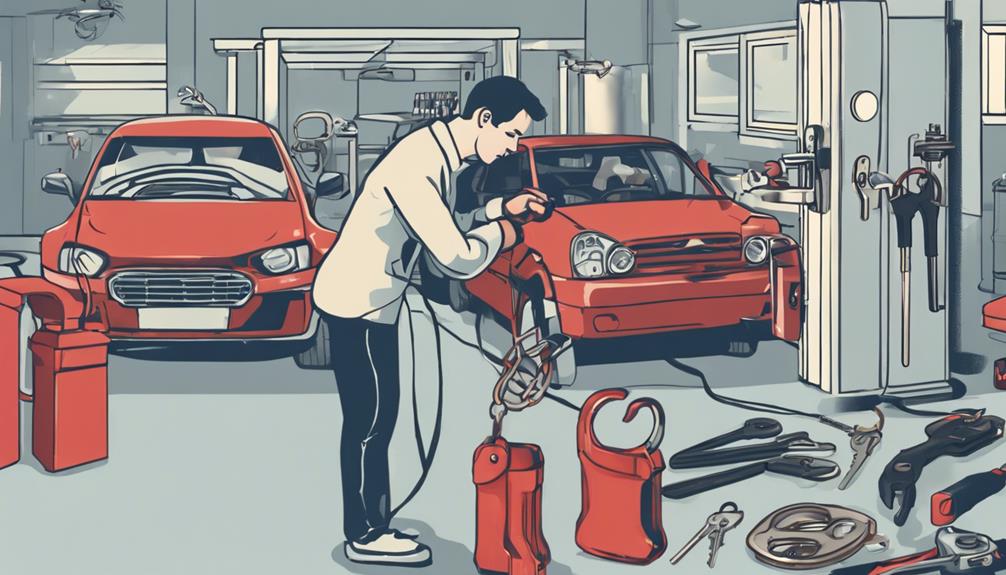When considering automotive re-keying, weigh the pros and cons of DIY versus hiring a pro. DIY might seem cost-effective, but it can lead to costly mistakes and damage, especially with complex locks. You'll need specific tools and knowledge, which can mean hours spent learning. In contrast, a professional locksmith offers expertise, proper tools, and quick service, typically finishing the job in about 1.5 hours. While there's a price tag for hiring a pro, their efficiency and skills usually make it a safer choice. Discover the factors that can help you make the best decision for your situation.
Key Takeaways
- DIY automotive re-keying can save money initially but may lead to costly mistakes and security risks.
- Professional locksmiths provide expertise, specialized tools, and ensure proper execution, minimizing the chance of errors.
- Time investment for DIY can exceed 4-7 hours, whereas professionals typically complete the job in about 1.5 hours.
- Complex locks and lack of experience can make DIY challenging, increasing the likelihood of damaging the lock system.
- Evaluating your skills, budget, and time constraints is crucial in deciding between DIY and hiring a professional.
Understanding Automotive Re-keying
When you find yourself locked out of your vehicle or need to enhance your car's security, understanding automotive re-keying becomes vital. It involves changing the internal mechanism of your car's lock so that old keys won't work anymore. This process can either be tackled through DIY methods or by hiring a professional automotive locksmith.
To successfully re-key your car locks, you'll need specific tools and a clear understanding of the mechanism involved, as outlined in mastering car lock re-keying.
If you're considering car rekeying DIY vs professional, think about your skills and resources. While DIY can save you money, it may lead to mistakes, especially if you lack experience with automotive locks. You might end up damaging the lock, which could create more issues down the line.
On the other hand, professional automotive rekeying guarantees that the job is done right the first time. Skilled locksmiths bring expertise and specialized tools, offering peace of mind and reliable security for your vehicle. They can also provide valuable advice on enhancing your car's overall security.
Weighing the pros and cons of an automotive locksmith vs DIY is vital in determining the right approach to safeguarding your vehicle. Your choice impacts not just your time but also your car's integrity and safety.
Costs of DIY Vs Professional
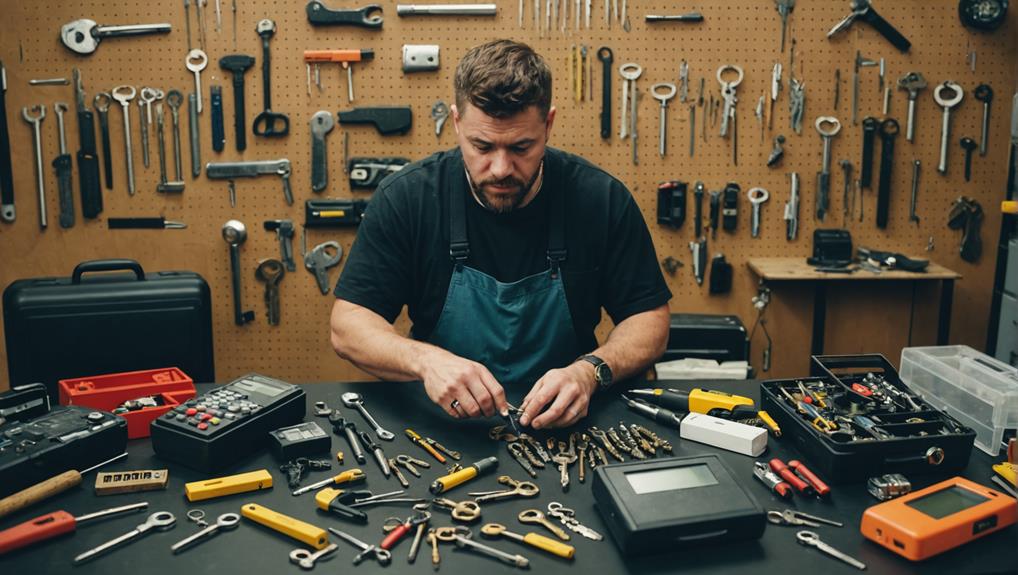
When considering automotive re-keying, you'll need to weigh the costs of doing it yourself against hiring a professional.
Many DIY enthusiasts find themselves facing challenges like misalignment or incorrect key cuts, which can lead to additional expenses and frustration.
Factor in the expenses for tools, the time you'll invest, and the potential costs that come from making mistakes, especially when addressing common problems encountered.
Each option has its financial implications, and understanding them can help you make the best choice.
Tool Expenses Comparison
Deciding between DIY automotive re-keying and hiring a professional often comes down to tool expenses.
Investing in the right tools can make or break your DIY car rekeying experience. Here's a quick comparison of potential costs:
- Tool Kit: A basic rekeying kit can range from $50 to $150, depending on the brand and quality. You'll need a good set to tackle the job effectively.
- Specialized Tools: If your vehicle requires specific tools, like lock picks or key extractors, expect to pay an additional $30 to $100. These costs can add up quickly.
- Professional Service: On the other hand, hiring a pro generally costs between $100 and $200 for car lock rekeying. This covers their tools, expertise, and time, so you won't have to worry about the upfront investment in equipment.
Consider your budget and the tools you may need.
If you're passionate about helping others and want to learn a new skill, DIY might be worth it.
But if you want a quick and reliable solution, hiring a professional might be the best choice for you.
Time Investment Analysis
Time is an essential factor to take into account in the DIY versus professional automotive re-keying debate. When you choose to handle re-keying yourself, you might think you're saving money, but consider the hours you'll spend learning the process, gathering tools, and executing the task.
If you're not experienced, you could find yourself frustrated and overwhelmed, ultimately delaying your ability to serve others.
On the other hand, hiring a professional might seem like a higher upfront cost, but it often translates into a quicker and more efficient solution. Professionals have the expertise and tools necessary to re-key your vehicle swiftly, allowing you to get back to what matters most—helping others.
Additionally, think about the value of your time. If you're juggling multiple responsibilities, the hours spent on DIY could be better spent on tasks that directly benefit your community or family.
In the end, weigh your options carefully. Whether you decide to DIY or hire a pro, consider the long-term implications of your time investment and how it aligns with your commitment to serving others in your life.
Potential Mistake Costs
Mistakes during automotive re-keying can lead to costly consequences, whether you choose to go the DIY route or hire a professional.
If you think you can save money by handling it yourself, consider the potential pitfalls. Here are three key mistake costs you might encounter:
- Incorrect Key Cuts: A poorly cut key can damage your ignition system, leading to expensive repairs that far exceed the cost of hiring an expert.
- Lock Cylinder Damage: If you mishandle the lock cylinder during the re-keying process, you could cause irreparable damage, requiring a complete lock replacement.
- Security Risks: Failing to properly re-key can leave your vehicle vulnerable to theft, which not only affects your wallet but also your peace of mind.
Difficulty Level of Re-keying
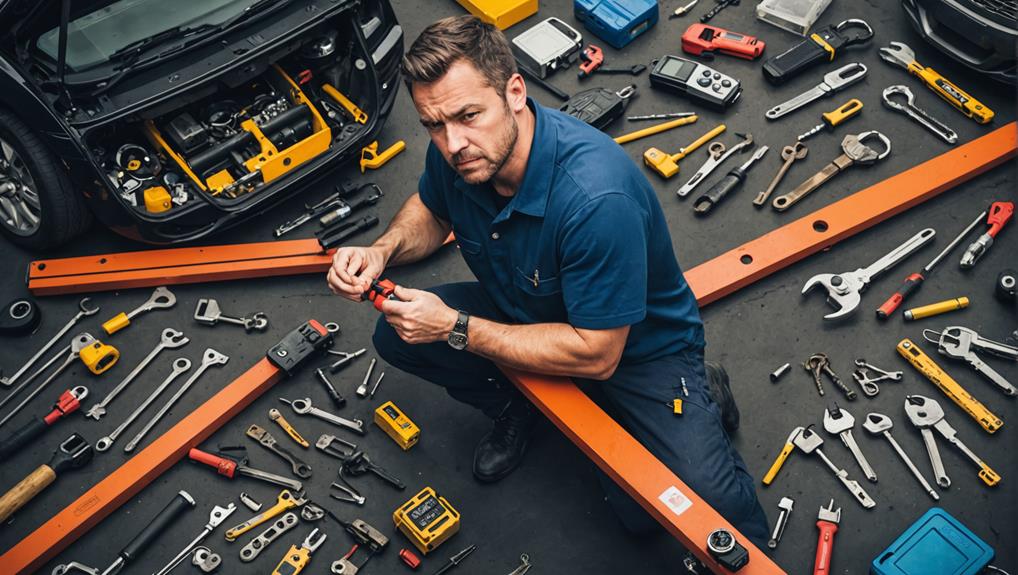
Re-keying your vehicle's locks isn't as straightforward as it might seem, and the difficulty level can vary considerably depending on your skills and the type of lock involved. If you're handy with tools and have experience in lock mechanisms, you might find the task manageable.
However, for many, the intricacies of automotive locks can be overwhelming, especially when dealing with specific techniques for mastering motorcycle and scooter lock re-keying.
Different vehicles come with various locking systems, some of which are more complex than others. For instance, high-security locks often require specialized knowledge and tools. If you're unfamiliar with the specific lock type in your vehicle, you might face challenges that lead to frustration and potential damage.
Moreover, re-keying involves precise adjustments to the pins and springs within the lock, which can be tricky without the right techniques. If you don't have a steady hand or a keen eye for detail, you could easily misalign components, rendering the lock ineffective.
Ultimately, if you feel uncertain about your abilities or the complexity of your vehicle's locks, hiring a professional can save you time and effort. They bring expertise that guarantees the job is done right, allowing you to focus on serving others while ensuring your vehicle's security.
Risks of DIY Automotive Re-keying
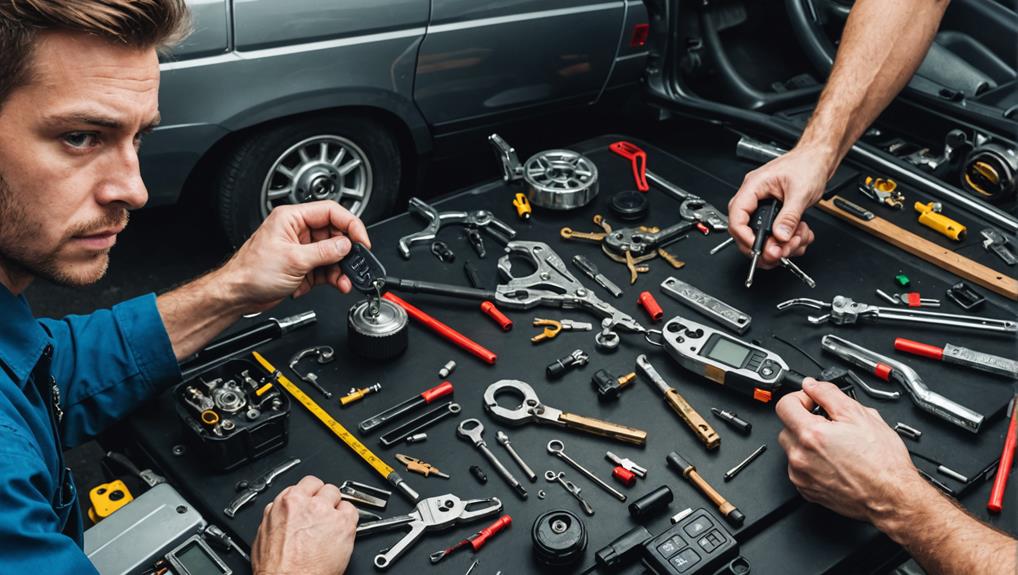
Taking on the task of DIY automotive re-keying can come with significant risks that may catch you off guard. While your intentions might be good, the potential pitfalls could lead to more trouble than it's worth.
As with many DIY projects, the challenge lies in the expertise required to perform the task correctly, and without proper knowledge, you might overlook important aspects of the process the benefits and challenges of DIY.
Here are three key risks to ponder:
- Security Compromises: If you make a mistake during re-keying, it could leave your vehicle vulnerable to theft. A poorly done job might allow anyone with a basic understanding of locks access to your car.
- Damage to Your Lock System: Without the right tools and experience, you could unintentionally damage the lock mechanism. This damage might lead to expensive repairs or replacements that could've been avoided.
- Time and Effort: DIY projects can often take longer than anticipated. If you hit a snag, you might find yourself frustrated and without a working vehicle while trying to solve the problem.
Benefits of Hiring a Professional
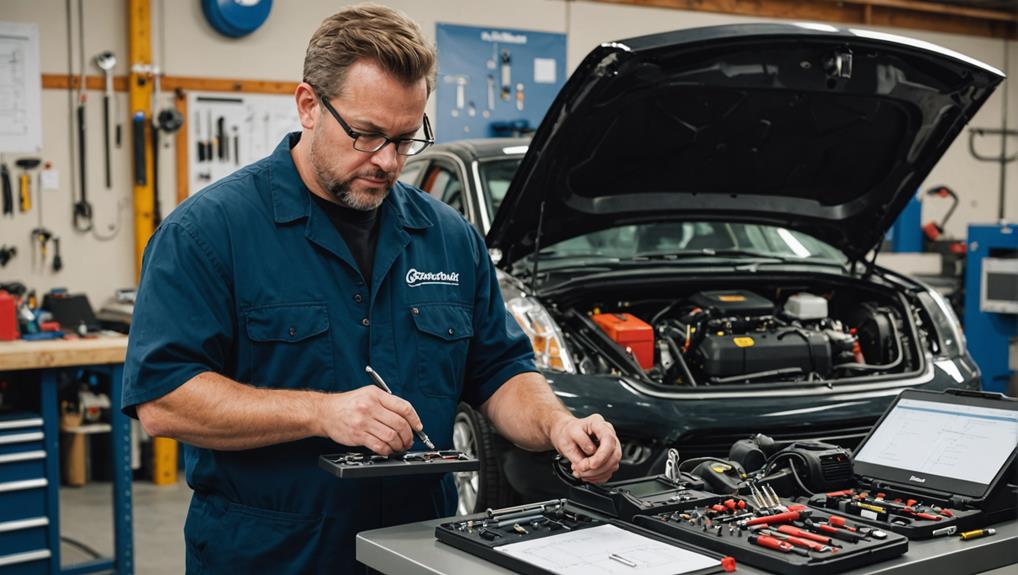
When you hire a professional for automotive re-keying, you benefit from their expertise and experience, ensuring the job's done right.
Professionals are also knowledgeable about various options, including keyless entry systems, which can enhance your vehicle's security.
They can also save you time by quickly addressing the issue without the trial and error of DIY attempts.
Plus, they come equipped with the proper tools and equipment, making the process smoother and more efficient.
Expertise and Experience
While you might feel confident tackling automotive tasks on your own, hiring a professional for re-keying offers significant advantages regarding expertise and experience.
Professionals bring specialized knowledge and skills that guarantee the job is done right the first time. This is especially important when it comes to the security of your vehicle.
Here are three key benefits of opting for an expert:
- Technical Knowledge: Professionals are trained to understand the intricacies of various locking systems, which helps them identify the best solutions for your specific needs.
- Precision Tools: They've access to advanced tools designed specifically for automotive re-keying, allowing for more accurate and efficient work than standard DIY methods.
- Troubleshooting Skills: If any issues arise during the re-keying process, a pro can quickly diagnose and fix them, saving you from potential headaches and guaranteeing your vehicle's security.
Time Efficiency
Opting for a professional to handle your automotive re-keying can save you a significant amount of time. When you hire an expert, you're not just paying for their skills; you're also freeing up your own schedule. Instead of fumbling with locks and keys, you can focus on what truly matters—serving your family or community.
Here's a quick comparison of time investment:
| DIY Approach | Hiring a Pro |
|---|---|
| Research and learn (2+ hrs) | Quick assessment (30 mins) |
| Trial and error (2-5 hrs) | Efficient execution (1 hr) |
| Total: 4-7+ hours | Total: 1.5 hours |
Proper Tools and Equipment
Hiring a professional for automotive re-keying means gaining access to the right tools and equipment tailored for the job. Unlike the average DIYer, a skilled locksmith uses specialized instruments that guarantee precision and effectiveness.
This not only saves you time but also assures a successful outcome.
Here are three essential tools that a professional brings to the table:
- Key Cutting Machine: This device accurately cuts new keys, ensuring they fit perfectly in your vehicle's locks.
- Lock Pick Kit: A professional can gain entry to your car without damaging the locking mechanism, preserving its integrity.
- Key Programming Tool: For modern vehicles, this tool programs transponder keys, ensuring they function properly with your car's ignition system.
Making the Right Choice
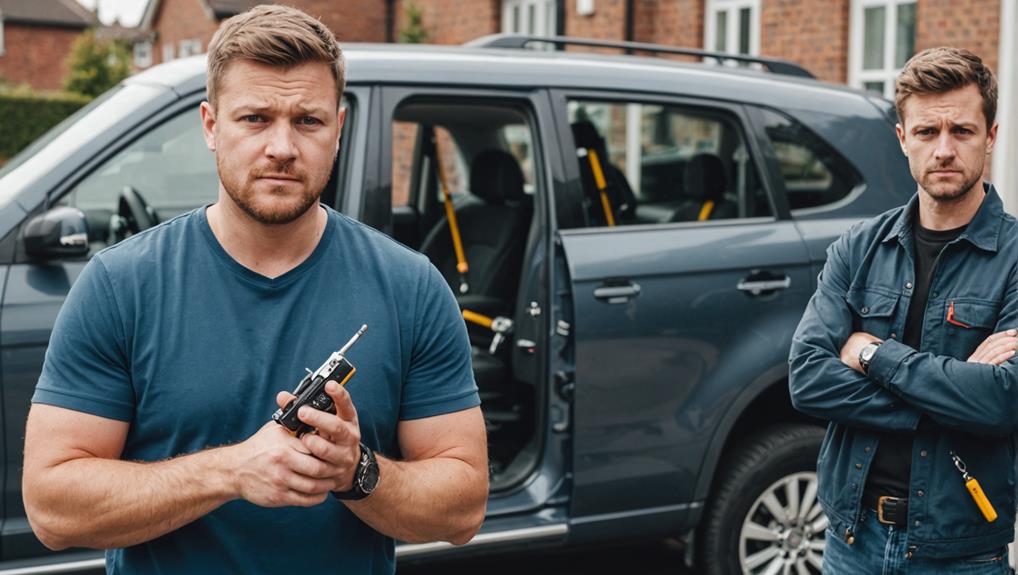
When it comes to automotive re-keying, weighing your options can make a significant difference in both time and cost. A detailed cost comparison can help you understand the financial implications of each choice; DIY vs. Professional re-keying services can vary greatly, depending on your specific situation.
You need to evaluate your skills and the complexity of the task. If you're experienced with tools and have a clear understanding of lock mechanisms, a DIY approach might save you money. However, if you're unsure or lack the necessary equipment, hiring a professional could save you time and prevent potential mistakes.
Think about the value of your time. If you're busy with other responsibilities, the convenience of hiring a pro can be worth the investment.
Professionals bring expertise and efficiency, ensuring the job is done correctly the first time. They also often provide warranties for their work, which gives you added peace of mind.
Ultimately, making the right choice depends on your unique situation. Assess your budget, time constraints, and comfort level with DIY projects.
If you prioritize serving others, remember that a well-done job benefits not just you, but anyone who uses the vehicle. Whether you DIY or hire a pro, choose what aligns best with your skills and needs.
Frequently Asked Questions
How Long Does Automotive Re-Keying Typically Take?
Automotive re-keying typically takes about 30 minutes to an hour, depending on the vehicle's make and model.
If you're handling it yourself, you'll need to gather the right tools and possibly review some guides.
If you're working with a professional, they'll efficiently manage the entire process, guaranteeing everything's properly aligned and functional.
Either way, you'll want to make sure the job's done right for the safety and convenience of everyone involved.
Will Re-Keying Affect My Car's Warranty?
Re-keying your car typically won't void your warranty, as long as you use quality parts and follow manufacturer guidelines.
Curiously, about 35% of vehicle owners aren't aware that minor modifications like re-keying can actually enhance security.
By ensuring you're informed and using the right methods, you're protecting both your vehicle and its warranty.
Always check your warranty details, and you can serve others by sharing this knowledge to help them safeguard their investments.
Can I Re-Key a Smart Key?
Yes, you can re-key a smart key, but it's not as straightforward as with traditional keys.
Smart keys contain electronic components that require specialized equipment to program them to your vehicle.
If you have the right tools and knowledge, you might be able to handle it yourself.
However, if you're unsure, it's better to consult a professional who can guarantee it's done correctly, keeping your car's security intact.
Are There Any Tools Needed for DIY Re-Keying?
Re-keying a smart key's like trying to bake a cake without a recipe; it can be tricky if you don't have the right tools.
You'll need a re-keying kit, which includes key blanks, a pinning kit, and possibly a small screwdriver.
Make sure you've also got a reliable set of instructions.
If you want to serve others by helping them with their key issues, being well-prepared is essential for success!
What Brands of Cars Commonly Require Re-Keying?
Many brands commonly require re-keying, especially when you've lost a key or switched locks.
You'll often find that vehicles from manufacturers like Honda, Toyota, Ford, and Chevrolet need this service.
Luxury brands, such as BMW and Mercedes-Benz, may also necessitate re-keying due to advanced security systems.
Knowing which brands often require this can help you prepare for potential key issues and guarantee you're ready to assist others in need.
Conclusion
When it comes to automotive re-keying, think of it like baking a cake: you can try to whip it up yourself, but a pro knows the right ingredients and techniques to avoid a flop. Sure, DIY might save you some cash, but the risks could lead to bigger headaches down the road. Weigh the costs, your skill level, and the potential for mistakes—sometimes, it's just smarter to let an expert handle it. Your car will thank you!

